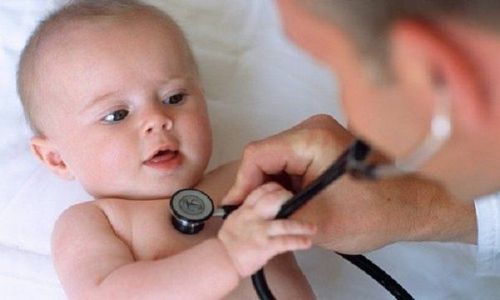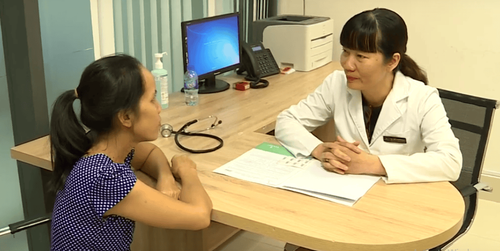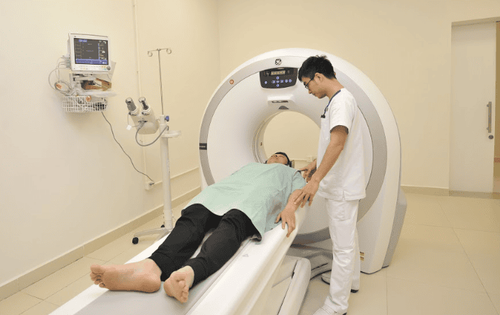This is an automatically translated article.
Women with congenital heart disease who become pregnant or discover heart disease during pregnancy are at increased risk for life-threatening complications for themselves and their unborn baby. Pre-pregnancy cardiology is the best way to prevent possible risks.1. Changes in the cardiovascular system during pregnancy
During pregnancy, a woman's heart and blood vessels have many changes, the changes of the cardiovascular system during pregnancy include:
1.1 Increased blood volume The body will increase 40-50% blood volume in 3 first month of pregnancy and maintain this level throughout pregnancy. Cardiac output will increase by 30-40% with an increase in blood volume.
During labor, the output may increase again during uterine contractions, but decrease between contractions. After birth, there is an increase in blood supply returning to the circulatory system from the pelvis, the capillary bed in the placenta and the lower extremities, because the uterus is empty, the compression has been released.
1.2 Increased Heart Rate Your heart rate will increase to about 10-15 beats/minute from normal.
1.3 Decreased Blood Pressure Due to hormonal changes and increased blood flow to the uterus, in some pregnant women, blood pressure can drop about 10mmHg from normal.
In addition, pregnant women may have a state of hypercoagulability that increases the risk of thromboembolism.
2. Heart disease symptoms in pregnancy
Changes in the cardiovascular system will cause symptoms such as fatigue, shortness of breath, heart palpitations, leg swelling,... these may be just normal symptoms, but they can also be symptoms of worsening symptoms. of heart disease in women with congenital heart disease or those with onset of heart disease during pregnancy.
Heart disease during pregnancy threatens the health of both mother and fetus. Although there is no history of cardiovascular disease, pregnant women should not be subjective, especially when they often have symptoms such as:
Coughing up blood, feeling chest tightness, chest fatigue, fainting on exertion due to heart failure. pinch, change the axis.

Căng tức ngực khi gắng sức
Shortness of breath, difficulty breathing when lying down, can appear from the 5th month of pregnancy and worsen with gestational age. Drumstick fingers, cupped watch face, cyanosis Pain in the calf, inflamed leg swelling, pain that increases when palpating the femoral vein, these are signs of thrombophlebitis of the lower extremities. When having the above symptoms, pregnant women should have their cardiovascular function checked, especially when they have risk factors such as old age, obesity, diabetes, high blood pressure. Some women do not know they have heart disease, when they are pregnant, the symptoms of the disease will become obvious. Therefore, it is best for pregnant women to have a general examination, including a cardiovascular examination to detect risks early before deciding to become pregnant.
3. Risks of heart disease during pregnancy
3.1 Risk to pregnancy A mother with heart disease can cause nutritional hypoxia to the fetus. Depending on the severity of the disease and the time of pregnancy, it can cause different effects such as:
Fetal malnutrition, low birth weight for gestational age Intrauterine growth retardation, chronic fetal distress, Threat of miscarriage, miscarriage Pregnancy Threatened preterm birth, premature birth Fetal death in utero, fetal death during labor The fetus can be deformed in women with congenital heart disease with cyanosis. 3.2 Risks to the mother Pregnancy status will greatly affect the health of the pregnant woman with heart disease, especially at the end of pregnancy, the burden on the heart increases. Possible risks to the mother's health are:
Acute heart failure, acute pulmonary edema Pulmonary embolism Pulmonary embolism Cardiac arrhythmias Anemia in pregnancy Thromboembolism Gestational hypertension causes preeclampsia , eclampsia Sudden death
4. Should women with heart disease get pregnant?
Pregnancy and having children is a woman's vocation and happiness, women with heart disease are no exception, and also want to have children and a normal family. The good news is that most pregnant women with heart disease can give birth to healthy babies if the pregnancy is properly cared for and monitored. Most heart diseases can now be effectively treated and controlled, with mild heart diseases, pregnancy does not affect the health of the fetus and mother much. However, to be on the safe side, if under some of the following circumstances, women should not become pregnant:People with pulmonary hypertension, especially patients with Eisenmenger syndrome. In this group of patients, the maternal mortality rate is about 30%. In women with reduced cardiac function, EF <30%, these patients will not respond to volume overload during pregnancy. People with dilated aorta, mitral aortic valve,... If the aorta >45mm, there is a risk of aortic dissection or rupture during pregnancy. People with severe arrhythmia, severe hypertension that is not well controlled.

Người có rối loạn nhịp tim nặng, tăng huyết áp nặng chưa được kiểm soát tốt không nên mang thai
People with valvular heart disease (valvular stenosis, valvular regurgitation) have not been thoroughly treated. In particular, people with aortic stenosis, are unable to maintain normal cardiac output. Women with heart disease during pregnancy need to be closely monitored by a cardiologist and obstetrician during pregnancy. In women with congenital heart disease, their baby also has a higher risk of heart disease at birth than other children.
In these cases, the cardiologist can do an echocardiogram around the 10th week of pregnancy to check the fetus for heart damage or not for appropriate treatment. During pregnancy, pregnant women must strictly follow the doctor's instructions, have a suitable diet so as not to gain excessive weight, eat less salt (<2g/day), need to rest a lot, and avoid physical activity. force, rest on your left side for at least 1 hour/day, avoid anemia, re-examine on time, when you have abnormal symptoms, you must immediately go to medical facilities for examination by doctors and timely intervention.
5. What should women with heart disease do when planning to get pregnant?
All women planning to become pregnant should see a cardiologist, especially women who already have cardiovascular disease. The doctor will perform a physical examination and assign a number of paraclinical investigations to assess the extent of the disease, thereby advising the patient whether it is safe to be pregnant or not, during pregnancy there may be risks. What are the risks, what drugs to take before pregnancy, the importance of closely monitoring the pregnancy, signs that the patient is in danger during pregnancy as well as during labor... To minimize the risks , pregnant women with heart disease must be delivered in a hospital that specializes in cardiology.
For patients with cardiovascular disease during pregnancy, regular antenatal check-ups are extremely necessary, helping to protect the health of both the mother and the development of the fetus. Currently, Cardiology Center - Vinmec Times City International General Hospital is a specialized cardiology clinic put into operation from March 2019 with leading equipment and technology in Vietnam, patients If you have a heart condition, you can completely trust the expertise of the doctor and the treatment regimen here. In addition, Vinmec International General Hospital also offers a maternity package that takes care of pregnant women and their babies from pregnancy to labor.
Please dial HOTLINE for more information or register for an appointment HERE. Download MyVinmec app to make appointments faster and to manage your bookings easily.













